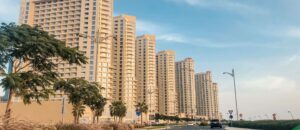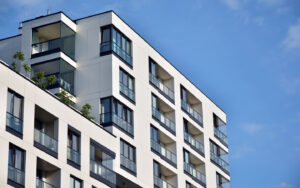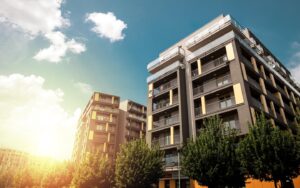Understanding Commonhold in Dubai
Definition and Concept of Commonhold
Commonhold is a type of property ownership in Dubai that allows multiple owners to share property ownership. It is a relatively new concept in Dubai and was introduced in 2008. Commonhold ownership is a form of collective ownership where each owner owns a share in the property’s common areas, such as the swimming pool, gym, and other shared facilities.

Commonhold vs. Freehold Ownership
Freehold ownership and commonhold are two different types of property ownership in Dubai. Freehold ownership is the most common type of ownership in Dubai and allows the owner to own the property outright, including the land on which the property is built. On the other hand, commonhold ownership only enables the owner to own a share of the property, and the land on which the property is built is owned by the developer or the government.
Commonhold vs. Leasehold Ownership
Commonhold and leasehold ownership are also different types of property ownership in Dubai. Leasehold ownership is where the owner only owns the property for a fixed period, usually 99 years. At the end of the lease period, the landlord regains control of the property. On the other hand, commonhold ownership is a perpetual form of ownership that does not have a fixed lease period.
Here are some bullet points that highlight the main ideas:
- Commonhold ownership is a form of collective ownership where each owner owns a share in the property’s common areas.
- Freehold ownership allows the owner to own the property outright, including the land on which the property is built.
- Leasehold ownership is where the owner only owns the property for a fixed period, usually 99 years.
- Commonhold ownership is a perpetual form of ownership that does not have a fixed lease period.
In conclusion, commonhold ownership is a relatively new concept in Dubai that allows multiple owners to share property ownership. Understanding the differences between commonhold, freehold, and leasehold ownership is essential to make an informed decision when buying or investing in a property in Dubai.
Legal Framework for Commonhold Properties
Commonhold properties in Dubai are governed by regulations and laws that protect the owners’ rights and interests. This section covers the legal framework for commonhold properties in Dubai, including the Dubai Land Department (DLD) regulations, inheritance laws, ownership transfer, and title deeds.
Dubai Land Department (DLD) Regulations
The DLD regulates the real estate sector in Dubai, including commonhold properties. The DLD has established regulations governing commonhold property ownership, registration, and transfer. These regulations ensure that commonhold properties are managed efficiently and transparently.
Some of the DLD regulations that apply to commonhold properties in Dubai include:
- Service Charge Index: Owners of commonhold property in Dubai can calculate their service charges using the Service Charge Index on the official website of the Dubai Land Department. Using this, commonhold property owners can see the current service charges for their building and the exact breakdown of the fees.
- Standard Property Register: The DLD creates a new standard property register that includes the following information:
- Land parcels belong to the developers and will be used to construct shared properties.
- Units designated for separate ownership inside the common property that the developers sold, along with the names of the unit owners.
Inheritance Laws and Commonhold
Inheritance laws in Dubai allow for the transmission of commonhold properties among successive generations of a family. The Dubai Family Ownership of Common Property Law was published in August 2020 to govern family ownership of common property in Dubai. This law establishes a legal framework for family ownership of common property in Dubai and facilitates its transmission among successive generations.
Ownership Transfer and Title Deed
The ownership of a commonhold property can be transferred through the Dubai Land Department. The transfer process involves the registration of the transfer of ownership with the DLD and the issuance of a new title deed. The transfer of ownership must be done by the DLD regulations and the terms and conditions of the commonhold property’s declaration.
In conclusion, the legal framework for commonhold properties in Dubai ensures that the owner’s rights are protected and that the properties are managed efficiently and transparently. The DLD regulations, inheritance laws, ownership transfer, and title deeds play a significant role in ensuring a robust legal framework governs commonhold properties in Dubai.

Buying Commonhold Property in Dubai
When buying commonhold property in Dubai, remember a few essential things. Here are some critical considerations for anyone looking to purchase a commonhold property in Dubai:
The Buying Process
The process of buying a commonhold property in Dubai is pretty straightforward. Here are the steps involved:
- Identify the property you want to buy: Identify the commonhold property you wish to purchase. This could involve searching online listings or working with a real estate agent.
- Make an offer: Once you’ve found a property you’re interested in, you’ll need to make an offer to the seller. This offer should include the purchase price and any other terms or conditions you want to include.
- Negotiate the terms: The seller may counter your offer with different terms or conditions. You’ll need to negotiate until you reach an agreement that works for both parties.
- Sign a contract: Once you’ve agreed to the terms, you must sign one. This contract will outline the purchase price, payment terms, and other transaction details.
Due Diligence and Documentation
Ensure all the required paperwork is in place and perform due diligence before purchasing a commonhold property in Dubai. Here are some steps you can take to protect yourself:
- Conduct a title search: A title search will help you verify that the seller has the legal right to sell the property.
- Review the strata documents: Commonhold properties are typically governed by a strata corporation. You’ll want to review the strata documents to ensure the property is managed correctly.
- Hire a lawyer: It would be better to hire a lawyer to check the contract and ensure everything is in order.
Financing and Deposits
Regarding financing and deposits, commonhold properties in Dubai are similar to others. Here are some things to keep in mind:
- Down payment: A down payment of at least 25% of the buying price is usually required.
- Financing: You can finance your commonhold property purchase through a bank or other financial institution.
- Fees: In addition to the purchase price, you’ll also need to pay various costs, such as registration fees, agent fees, and transfer fees.
Buying a commonhold property in Dubai can be a great investment opportunity. You can make a wise buy that will yield long-term worth by following the proper procedures and researching.
Selling and Renting Commonhold Properties
Commonhold properties in Dubai are popular among buyers due to their ownership rights and low service charges. Several market trends and considerations must be remembered when selling or renting a commonhold property.
Market Trends for Selling
The Dubai property market constantly evolves, and sellers must stay current with the latest trends. Some main points to consider when selling a commonhold property include:
- Current market demand: Sellers should research the current demand for commonhold properties in their area to determine the best time to sell.
- Property condition: Buyers are more likely to purchase a property in good condition, so sellers should ensure that it is well-maintained and free from significant issues.
- Pricing: A property must be priced appropriately to sell swiftly and equitably. To get the most outstanding price for their house, sellers should examine the costs of nearby comparable properties and speak with a real estate agent.
Long-term Rent Considerations
Renting out a commonhold property can be a profitable long-term investment. However, there are several factors to consider before renting out a property, including:
- Rental rates: Sellers should research the current rental rates in their area to determine the best price for their property.
- Tenant screening: To make sure a prospective renter is trustworthy and would take excellent care of the property, it’s crucial to do a complete background check on them.
- Maintenance and repairs: Landlords are responsible for making necessary repairs and maintaining the building’s condition. When setting the rental price, sellers should consider the cost of upkeep and repairs.
Rights and Restrictions
Commonhold properties have certain rights and restrictions that buyers and sellers should know. Some key considerations include:
- Ownership rights: Buyers of commonhold properties have individual ownership rights to their unit but must pay their share of the building’s maintenance fees.
- Restrictions on alterations: Commonhold properties are subject to certain limitations on alterations and renovations. Buyers and sellers should consult with the building’s management to determine what alterations are allowed.
- Rental restrictions: Some commonhold properties may have restrictions on renting out units. Buyers and sellers should check the building’s rules and regulations before renting a property.
Overall, selling or renting a commonhold property in Dubai requires careful consideration of market trends, long-term rental considerations, and ownership rights and restrictions. Buyers and sellers in the Dubai real estate market may make educated judgments and realize their objectives by keeping current and collaborating with a reliable real estate agent.

The Investment Perspective
Investing in commonhold property in Dubai can be an attractive option for investors seeking a lucrative investment opportunity. Here are some key factors that investors should consider when assessing this type of investment:
Assessing Property Investment Areas
Dubai offers a variety of investment areas that are suitable for commonhold property investment. The most popular areas include Dubai Marina, Jumeirah Village Circle, Jumeirah Lake Towers, Palm Jumeirah, and Business Bay. These areas have a range of amenities and facilities, making them attractive to local and international investors.
Understanding Taxes and Fees
Investors should know the taxes and fees associated with commonhold property investment in Dubai. The Dubai Land Department charges a transfer fee of 4% of the property value, while the annual property maintenance fee can range from AED 5 to AED 10 per square foot. Investors should also know the service charges, ranging from AED 10,000 to AED 20,000 per year.
Real Estate Market Analysis
Investors should thoroughly analyze the real estate market in Dubai before investing in commonhold property. According to recent statistics, the average property prices in Dubai have surged by 16.9% through June 2023, while residential rents have risen by 22.8%. The market outlook for Dubai in 2024 is projected to have a 5% annual growth in capital appreciation and a 5% rental yield.
Investing in commonhold property in Dubai can be a promising investment opportunity for local and international investors. However, investors should thoroughly analyze the investment areas, taxes and fees, and real estate market before making investment decisions.
Ownership for Expatriates and Foreigners
Eligibility and Legal Provisions
Foreign nationals, including expatriate residents and non-resident investors, can buy freehold real estate in Dubai. They can buy, sell, or lease their property without limitations. However, the purchase or investment is only allowed in freehold areas designated by the government.
According to the Regulation No. 3 of 2006 Determining Areas for Ownership by Non-Nationals of Real Property in the Emirate of Dubai, foreign buyers (who don’t live in the UAE) and expatriate residents can acquire freehold ownership rights over property without any restrictions, usufruct rights, or leasehold rights for up to 99 years.
Impact of UAE Residence Visa on Ownership
Obtaining a UAE residence visa can positively impact property ownership for expatriates and foreigners. It can provide them with more stability and security in their investment. A residence visa allows them to open bank accounts and conduct other financial transactions efficiently.
Nationalities and Ownership Restrictions
There are no nationality restrictions on property ownership in Dubai. All foreign nationals can purchase property in freehold areas regardless of nationality. However, it is essential to note that there may be some restrictions on ownership in certain areas designated as leasehold or usufruct by the government.
In summary, foreign citizens, including non-resident investors and expatriate residents, can acquire property in Dubai on a freehold basis. Obtaining a UAE residence visa can give them more stability and security in their investment. There are no nationality restrictions on property ownership in Dubai, but some restrictions may apply in certain areas designated as leasehold or usufruct by the government.
Commonhold Property Management
Maintaining a good level of life for all inhabitants and paying close attention to detail are essential for managing a commonhold property in Dubai. Here are some critical aspects of commonhold property management in Dubai:
Maintenance and Service Charges
Maintenance and service charges are essential aspects of commonhold property management. These charges cover maintaining the property and its facilities, including cleaning, landscaping, security, and repairs. Service charges are based on the size of the property and are typically paid every quarter.
Regarding maintenance and service charges, working with a reputable real estate agent who can provide accurate information about the costs involved is essential. It is also necessary to pay maintenance and service charges promptly to avoid penalties or legal issues.
Community and Facilities Management
Community and facilities management are also essential aspects of commonhold property management. This includes managing common areas like swimming pools, gyms, and parks and organizing community events and activities.
To ensure the community is well-managed, working with a professional property management company with experience managing commonhold properties is essential. This helps ensure that facilities are well-maintained, events are well-organized, and residents are happy with their living environment.
Dispute Resolution
Dispute resolution is an essential aspect of commonhold property management. Disputes can arise between residents, the property management company, or residents and the owners’ association.
To resolve disputes fairly, it is essential to have clear rules and regulations in place. This can include a dispute resolution process that outlines the steps that will be taken to resolve any issues that arise.
Managing a commonhold property in Dubai requires a commitment to maintaining a high standard of living for all residents. By dealing with a reputable real estate agent and property management company and having clear rules and regulations in place, it is possible to ensure that the community is well-maintained and that residents are happy with their living environment.

Critical Locations for Commonhold Properties
Dubai is home to several vital locations for commonhold properties. These locations are popular among property buyers due to their prime location, amenities, and facilities.
Dubai Marina and Jumeirah Lake Towers
Dubai Marina and Jumeirah Lake Towers are two of the most popular locations for commonhold properties. Both areas are located in the heart of Dubai and offer stunning views of the city skyline and the Arabian Gulf. They are home to several tall buildings with various facilities, such as gyms, swimming pools, and round-the-clock security.
Some of the benefits of investing in a commonhold property in Dubai Marina and Jumeirah Lake Towers include:
- Being close to the beach and other well-liked attractions
- Availability of public transportation
- Numerous alternatives for food and entertainment
Downtown Dubai and Business Bay
Downtown Dubai and Business Bay are two other critical locations for commonhold properties. These areas offer a luxurious lifestyle, high-end shopping, and world-class dining options. They are home to some of the most iconic landmarks in Dubai, including the Burj Khalifa and the Dubai Mall.
Some of the benefits of investing in a commonhold property in Downtown Dubai and Business Bay include:
- Access to world-class amenities and facilities
- Proximity to some of the most popular attractions in Dubai
- A vibrant and cosmopolitan community
Palm Jumeirah and Jumeirah Village Circle
Palm Jumeirah and Jumeirah Village Circle are two other popular locations for commonhold properties in Dubai. It is home to several high-end resorts, luxury apartments, and villas. On the other hand, Jumeirah Village Circle is a family-friendly community that offers residents a range of amenities and facilities.
Some of the benefits of investing in a commonhold property in Palm Jumeirah and Jumeirah Village Circle include:
- Simple access to a lot of well-known sights and the beach
- Access to world-class amenities and facilities
- A family-friendly community with a range of activities for residents
Overall, Dubai offers a range of critical commonhold property locations, each with unique benefits and advantages. Real estate buyers should carefully weigh their alternatives and select a place that best fits their requirements and way of life.
Dubai MLS
For real estate specialists, Dubai MLS emerges as the compass of choice, directing the expedition through nascent brokerages, cultivating crucial connections with potential clientele, and expanding their professional galaxy. Within this vast cosmos of opportunities, Dubai MLS becomes the expansive universe. Venture into its diverse constellation of services and blaze your trail toward triumph.

Frequently Asked Questions
What are the differences between freehold and commonhold properties in Dubai?
- The buyer owns Freehold properties in Dubai, including the land and property.
- Commonhold properties in Dubai are apartments or units within a building owned jointly by multiple individuals, with each owner having a share of the common areas and facilities.
How does the commonhold system affect property ownership rights in Dubai?
- Under the commonhold system, each owner has a share of the common areas and facilities they are responsible for maintaining and managing.
- Every owner is also entitled to vote on significant issues about the management of the property, including approval of refurbishment plans and the selection of a management firm.
What are the responsibilities of a commonhold association in Dubai?
- The commonhold association is responsible for managing and maintaining the common areas and facilities of the property.
- This includes cleaning, landscaping, and repairing common areas like hallways, elevators, and parking lots.
- The association is also responsible for enforcing the rules and regulations related to the use and upkeep of the common areas and facilities.
Can foreign nationals purchase commonhold properties in Dubai?
- Yes, foreign nationals can purchase commonhold properties in Dubai.
- However, they must meet specific eligibility criteria and obtain the necessary approvals from the Dubai Land Department.
What legal protections are in place for commonhold property owners in Dubai?
- The Dubai government has enacted laws and regulations to protect the rights of commonhold property owners.
- These laws provide a legal framework for managing and maintaining commonhold properties and mechanisms for resolving disputes between owners.
How does the transfer of commonhold property ownership work in Dubai?
- The transfer of commonhold property ownership in Dubai is similar to that of freehold property ownership.
- The buyer must obtain approvals from the Dubai Land Department and pay the necessary fees and taxes.
- The transfer of ownership is recorded in the Dubai Land Department’s database, and the new owner assumes all the rights and responsibilities of the previous owner.












